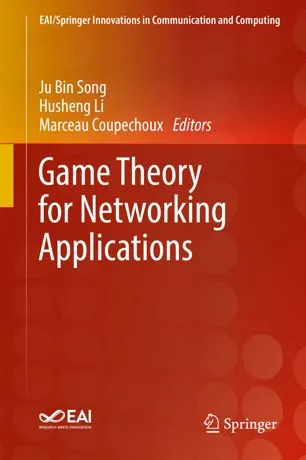Game Theory for Networking Applications
4.7
Reviews from our users

You Can Ask your questions from this book's AI after Login
Each download or ask from book AI costs 2 points. To earn more free points, please visit the Points Guide Page and complete some valuable actions.Welcome to the introduction of Game Theory for Networking Applications, an engaging and comprehensive deep dive into the intersection of game theory and modern networking. Authored by Ju Bin Song, Husheng Li, and Marceau Coupechoux, this book provides a structured approach to applying game theory to solve complex problems in networking systems, an area of immense importance in today's interconnected world. Whether you’re a researcher, practitioner, or student, this book offers valuable insights, practical examples, and a robust foundation to enhance your understanding and application of game-theoretic principles in networking environments.
Summary of the Book
In Game Theory for Networking Applications, the authors explore how game theory, a mathematical tool for analyzing competitive and cooperative interactions, can be applied to a wide range of real-world networking challenges. Networking systems are inherently multi-agent, meaning several independent entities (such as users, service providers, or devices) interact and negotiate resources. Game theory provides a coherent framework for modeling these interactions, designing strategies, and predicting outcomes in scenarios where every participant aims to maximize their own benefit.
The book is structured into multiple chapters that cater to both theoretical foundations and practical applications. It begins by introducing the fundamentals of game theory, including key concepts such as Nash equilibrium, utility functions, and cooperative/non-cooperative games. Then, it delves into specific networking domains, such as wireless communications, resource allocation in networks, power control, and security frameworks.
The authors skillfully illustrate how to bridge the gap between theory and practice. Through real-world case studies, they demonstrate the potential of game-theoretic tools to solve issues such as interference management, spectrum sharing, and fair resource allocation in wireless networks. Furthermore, the book highlights emerging areas like energy-efficient networking, distributed algorithm design, and the impact of game theory on cutting-edge technologies such as 5G/6G networks, Internet of Things (IoT), and cloud-edge architectures.
Key Takeaways
- Understand the core principles of game theory and its diverse types, including repeated games, evolutionary games, and auction mechanisms.
- Gain insights into how game-theoretic concepts are applied to networking challenges like traffic optimization, power control, and user cooperation.
- Learn about different strategies, including both cooperative methods (coalitional games) and competitive techniques (non-cooperative games), to foster collaboration or competition in networks.
- Explore practical solutions to real-world challenges in wireless networks, cognitive radio systems, and IoT frameworks using game-theoretic models.
- Discover innovative approaches to resource management, energy-efficiency optimization, and network security challenges.
Famous Quotes from the Book
"Game theory provides not just a lens to look at complex systems but a structured way to optimize network dynamics, ensuring fairness and efficiency."
"Networking is a game of strategies, innovation, and collaboration, where every decision shapes the ecosystem. Game theory helps us navigate this game intelligently."
"From optimizing scarce network resources to building scalable security models, game theory empowers engineers to develop innovative solutions to pressing challenges."
Why This Book Matters
Game Theory for Networking Applications is significant for several reasons. Firstly, it addresses the growing demand for efficient resource management in networking systems, a critical concern in the era of hyperconnected devices. As resources like bandwidth, spectrum, and energy are limited, understanding how to allocate them wisely among competing users is paramount. This book equips readers with actionable strategies to design efficient systems that perform optimally under real-world constraints.
Secondly, the book contributes to the advancement of the academic and industrial understanding of game theory’s role in networking applications. It simplifies complex mathematical concepts, making them accessible to readers with varying levels of expertise, from students to seasoned professionals. Its emphasis on both theoretical and practical aspects ensures a well-rounded learning experience.
Finally, this book is timely given the rise of advanced technologies like 6G, IoT, and edge computing. By addressing these new domains, the authors position the book as a forward-looking reference for solving tomorrow’s networking problems. The solutions presented in the book have broad implications, from improving user experience and lowering costs for service providers to making networks greener and more secure.
In conclusion, Game Theory for Networking Applications serves as a vital resource for anyone interested in understanding and leveraging the power of strategic interaction in the networking realm. Its systematic approach, detailed examples, and forward-thinking perspective make it an indispensable guide in the ever-evolving field of networking.
Free Direct Download
You Can Download this book after Login
Accessing books through legal platforms and public libraries not only supports the rights of authors and publishers but also contributes to the sustainability of reading culture. Before downloading, please take a moment to consider these options.
Find this book on other platforms:
WorldCat helps you find books in libraries worldwide.
See ratings, reviews, and discussions on Goodreads.
Find and buy rare or used books on AbeBooks.


